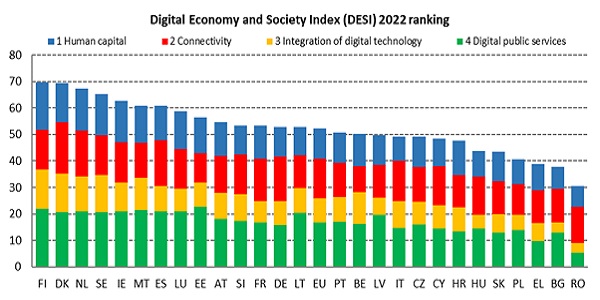 DESI 2022;
Credit: European Commission
DESI 2022;
Credit: European Commission
Luxembourg has climbed from fifth to third place in the European Commission's eGovernment Benchmark 2022; the Grand Duchy also ranked eighth in the Commission's 2022 Digital Economy and Society Index (DESI).
eGovernment Benchmark
The eGovernment Benchmark compares the digital public service maturity of 35 countries, namely European Union (EU) Member States, candidate countries, European Free Trade Association (EFTA) member countries and the United Kingdom (UK).
In the recently published 2022 ranking, Luxembourg ranked third, with a score of 87%, thus climbing two places compared to 2021 and eight places compared to 2020.
Marc Hansen, Luxembourg's Minister Delegate for Digitalisation, expressed his satisfaction with this result: "I am delighted with this international recognition of the efforts made by Luxembourg in terms of eGovernment. I congratulate the teams of the ministry and the CTIE [Government IT Centre], who work tirelessly to achieve efficient digital public services and who have thus participated in this progress, which places Luxembourg among the best in terms of eGovernment".
The "user centricity" dimension of the study indicates whether the approaches and procedures are available online, if their presentation is user-friendly and if these approaches are easy to consult and use on a mobile phone or tablet. One of the components of this indicator concerns the availability of online public services. In this context, Luxembourg achieved a score of 95%. Moreover, while in Europe, barely 6% of the services analysed are provided automatically, without the user requesting them, in Luxembourg this percentage stands at 16%. In its analysis, the European Commission assumed that this rate would continue to increase in the coming years thanks to the "once-only" principle, namely the consequent reuse of data available at state level.
The study's "transparency" benchmark analyses the extent to which public bodies provide clear information on the services provided as well as on how citizens' personal data are processed. In this category, Luxembourg achieved a score of 88%. In terms of "service design", it achieved a score of 100%.
The "key enablers" dimension looks at the technical and organisational preconditions that are in place for the provision of digital services, such as electronic identification (eID) and authentic sources. In this context, Luxembourg's score was 76%. Although the Grand Duchy lost three places in this part of the study compared to the other countries studied, it improved its scores for the two sub-categories eID and authentic sources.
The "Cross Border Services" dimension of the study indicates the extent to which users of public services from another European country can use a country's online services. Luxembourg obtained a score of 90%, with the European Commission emphasising its pioneering role in this area.
Digital Economy and Society Index
The European Commission also recently published the results of the 2022 Digital Economy and Society Index (DESI), which tracks the progress made in EU Member States in the digital field. Luxembourg ranked eighth out of 27 EU Member States in this index. However, the Commission noted that Luxembourg's performance growth was slower than that of other countries' with similar DESI scores. Luxembourg has raised its score by 6% on average every year between 2017 and 2022, which is among the lowest growth rates in the EU.








